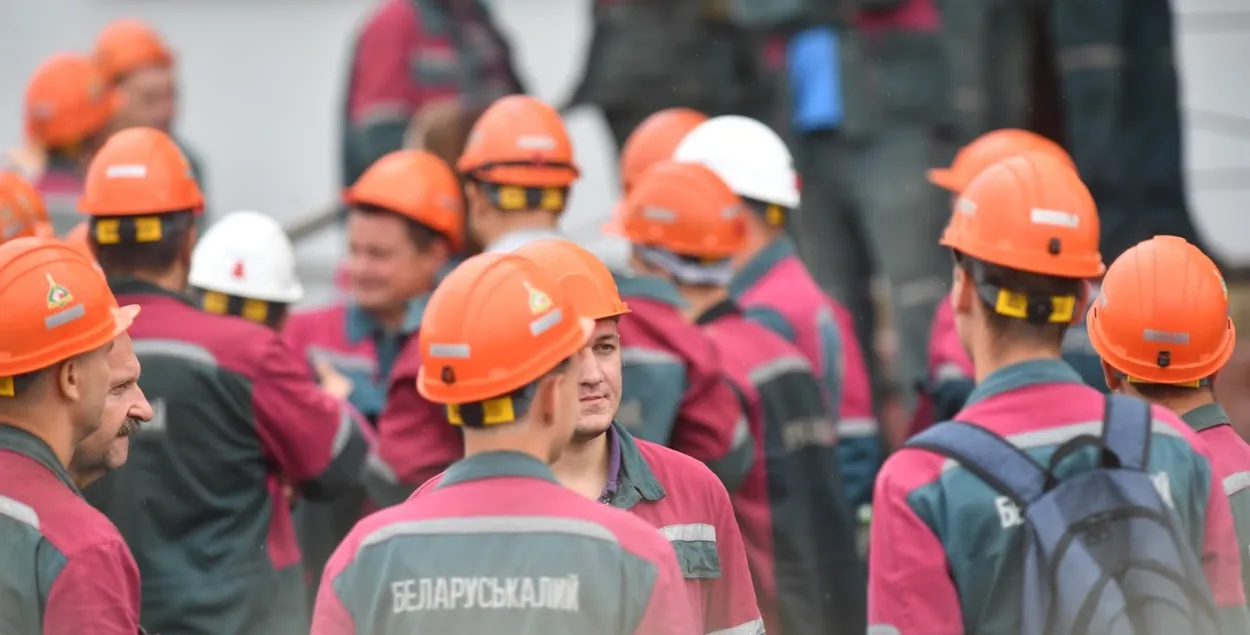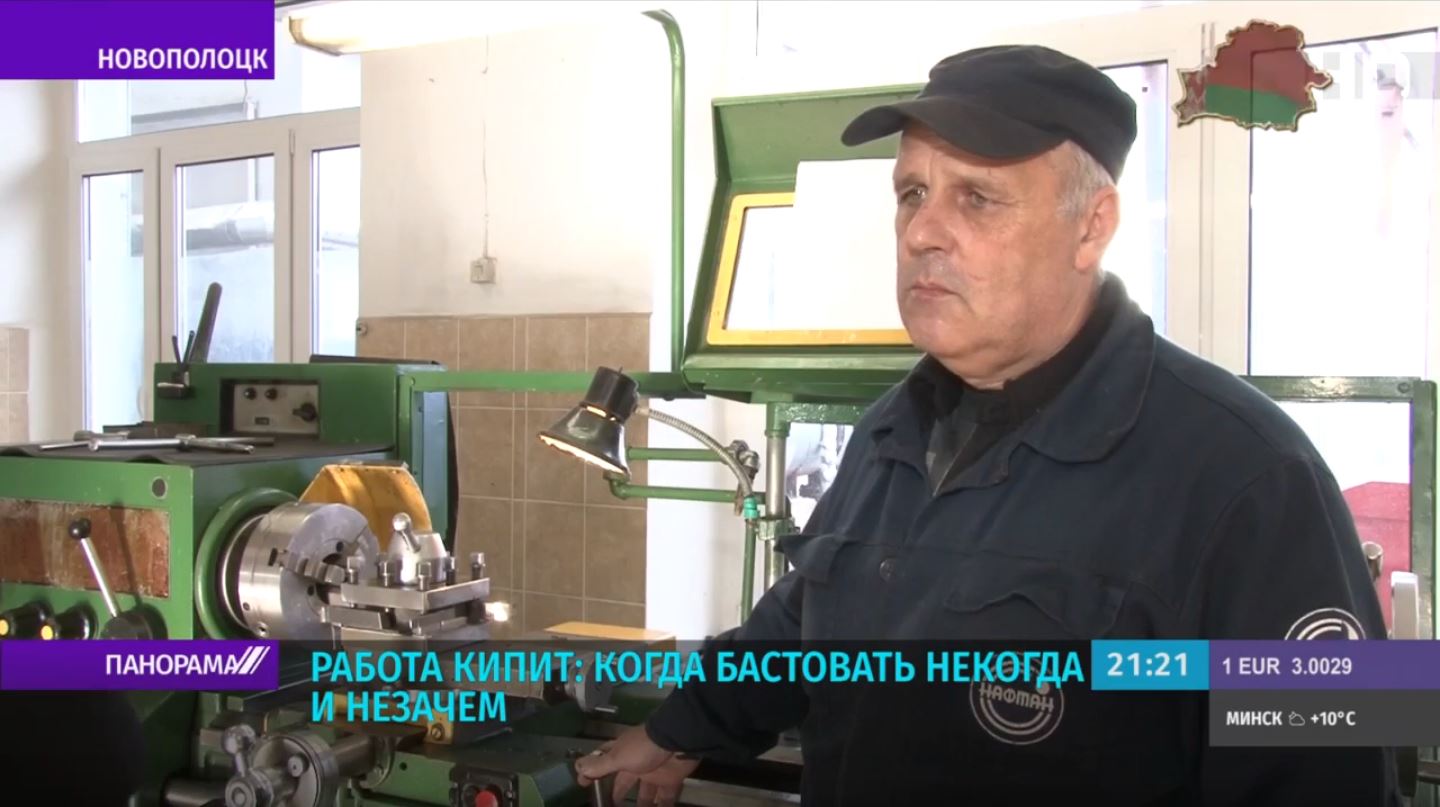State media try to persuade Belarusians not to strike

Workers of Belaruskali discussing the strike, August 2020 / Euroradio
The "people's ultimatum" announced by Svyatlana Tsikhanouskaya expired on 25 October. As early as Monday, protest leaders started calling on businesses and organizations to launch a large-scale strike. Although the pro-government "political scientists" claim that this idea will not be supported by anyone, the state media have been actively "treating" citizens, proving to them that it is not worth listening to strike appeals.
Euroradio has studied the arguments against strikes used by the state propaganda.
"The seat will be taken"
The narrative actively used in the state media claims that strikes will lead to almost complete economic collapse.
"Some naively ask the question: what is so terrible about it? Let's go on a strike for a week or two and then, if anything, let's go back to work. But here's the problem: will our foreign partners cooperate with unreliable enterprises that are weeks overdue in the supply of their products. When you return to the market after the strike, you will find that your place is occupied. In this case, the company faces bankruptcy, its employees face unemployment, and their children face poverty and even hunger," BSU professor Valer Baineu said in an interview.
Although Baineu is presented as an expert and has a doctorate in economics, his background is technical, and the topic of his doctoral dissertation is "Scientific and technological progress and energy conservation: consumer value analysis." He is also known as the author of the blog "Belarusian Scientists-Patriots for Integration in the Framework of the Former USSR," where he writes, among other things, about "the devastating impact on all of us of the banking and usury system, which methodically destroys the economies of Belarus, Russia and all other peripheral countries. This is the kind of expert he is.
Similar considerations about "losing markets" are also conveyed in statements by business leaders.
“If we don’t work, we won’t earn money, if we don’t fulfill contracts with partners, we will lose them and the markets as a whole. Who will benefit from it? Definitely not us,” said Alyaksandr Pshonny, deputy chairman of Bellesbumprom.
The director of "Krasny Pischevik", Senator Syarhei Anyukhousky also convinces the employees that only competitors will win.
"Strikes are always aimed at destabilizing the situation. Factories do not work, do not produce products, do not receive revenue. Consumers are left without the goods they need. Trust in partners is lost, as orders are not fulfilled. All this is detrimental to both the enterprise and the country's economy. In general, only competitors remain the winners," Anyukhouski said.
It is noteworthy that a whole series of such comments about the dangers of strikes have appeared in the state media since October 23.
"We have no time for strike"
The state media are also trying to convince Belarusians that no one supports the idea of strikes, and that it is only necessary to change the country with work.
“We have no time to think about strikes. We are used to working, we are used to making a living with our own hands,” said Raisa Kashalyova, an employee of the Slavyanka factory, in a comment to the state agency.
By coincidence, this very employee used to be the head of the local Belarusian Republican Youth Union at the enterprise, and during the presidential elections she was a member of the electoral commission.

“I don’t have colleagues who call for strikes. I believe that they are a minority. We do not even consider such an issue at the production floor, we have a lot of young people -- everyone works,” says Uladzimir Bedunko, an employee of Naftan.
There was also a "popular poll" on the air of Belarus 1, where the participants condemned the protests and calls for strikes. Again, quite by accident, one of the three speakers turned out to be the secretary of the local Belarusian Republican Youth Union cell in one of the Minsk universities, and the other is very similar to an employee of the House of Representatives' secretariat.
Rigged facts
To enhance the emotional component, the facts can be distorted a little or very bizarre logical connections can be built.
"The mechanic-repairman, who after "working for 20 years at a plant" became an experienced mechanic-repairman, did not have his contract extended. Apparently, they found an even more experienced one: well, 20 years have passed, and the person did not get better. He has not even allowed himself to become a member of a trade union in these two decades," Mukavozchyk jokes in one of the articles.
And this is an example of an outright lie. “Despite the large share of small and medium-sized companies in the GDP of developed countries, the backbone of their economies are large ones,” says another columnist for Belarus Today.
The nuance here is that industry provides less than 27% of Germany's GDP, and in the UK it is 17.5%. In Belarus, production accounts for 31.3% of GDP. The service sector has long become the main part of the economy.
On the air, ONT decided to slightly exaggerate the payroll of Belaruskali: the presenter claimed that the monthly payroll was $ 50 million, although in August the figure named was almost one and a half times less: 36 million. But it probably doesn't sound so impressive.


















